Aug 15, 2010
BREAKING: New paper makes a hockey sticky wicket of Mann
By Anthony Watts
Sticky Wicket ‘ phrase, meaning: “A difficult situation”.
Oh, my. There is a new and important study on temperature proxy reconstructions (McShane and Wyner 2010) submitted into the Annals of Applied Statistics and is listed to be published in the next issue. According to Steve McIntyre, this is one of the “top statistical journals”. This paper is a direct and serious rebuttal to the proxy reconstructions of Mann. It seems watertight on the surface, because instead of trying to attack the proxy data quality issues, they assumed the proxy data was accurate for their purpose, then created a bayesian backcast method. Then, using the proxy data, they demonstrate it fails to reproduce the sharp 20th century uptick.
Now, there’s a new look to the familiar “hockey stick”.
Before:
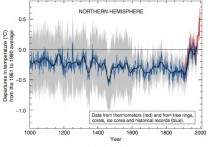
Enlarged here.. Multiproxy reconstruction of Northern Hemisphere surface temperature variations over the past millennium (blue), along with 50-year average (black), a measure of the statistical uncertainty associated with the reconstruction (gray), and instrumental surface temperature data for the last 150 years (red), based on the work by Mann et al. (1999). This figure has sometimes been referred to as the hockey stick. Source: IPCC (2001).
After:
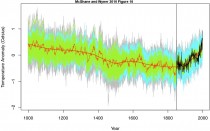
Enlarged here.. Backcast from Bayesian Model of Section 5. CRU Northern Hemisphere annual mean land temperature is given by the thin black line and a smoothed version is given by the thick black line. The forecast is given by the thin red line and a smoothed version is given by the thick red line. The model is fit on 1850-1998 AD and backcasts 998-1849 AD. The cyan region indicates uncertainty due to t, the green region indicates uncertainty due to β, and the gray region indicates total uncertainty.
Not only are the results stunning, but the paper is highly readable, written in a sensible style that most laymen can absorb, even if they don’t understand some of the finer points of bayesian and loess filters, or principal components. Not only that, this paper is a confirmation of McIntyre and McKitrick’s work, with a strong nod to Wegman. I highly recommend reading this and distributing this story widely.
Here’s the submitted paper:
A Statistical Analysis of Multiple Temperature Proxies: Are Reconstructions of Surface Temperatures Over the Last 1000 Years Reliable? (PDF)
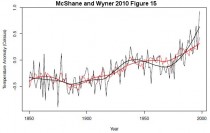
Enlarged here..
FIG 15. In-sample Backcast from Bayesian Model of Section 5. CRU Northern Hemisphere annual mean land temperature is given by the thin black line and a smoothed version is given by the thick black line. The forecast is given by the thin red line and a smoothed version is given by the thick red line. The model is fit on 1850-1998 AD.
We plot the in-sample portion of this backcast (1850-1998 AD) in Figure 15. Not surprisingly, the model tracks CRU reasonably well because it is in-sample. However, despite the fact that the backcast is both in-sample and initialized with the high true temperatures from 1999 AD and 2000 AD, it still cannot capture either the high level of or the sharp run-up in temperatures of the 1990s. It is substantially biased low. That the model cannot capture run-up even in-sample does not portend well for its ability to capture similar levels and run-ups if they exist out-of-sample.
Conclusion.
Research on multi-proxy temperature reconstructions of the earth’s temperature is now entering its second decade. While the literature is large, there has been very little collaboration with universitylevel, professional statisticians (Wegman et al., 2006; Wegman, 2006). Our paper is an effort to apply some modern statistical methods to these problems. While our results agree with the climate scientists findings in some respects, our methods of estimating model uncertainty and accuracy are in sharp disagreement.
On the one hand, we conclude unequivocally that the evidence for a “long-handled” hockey stick (where the shaft of the hockey stick extends to the year 1000 AD) is lacking in the data. The fundamental problem is that there is a limited amount of proxy data which dates back to 1000 AD; what is available is weakly predictive of global annual temperature. Our backcasting methods, which track quite closely the methods applied most recently in Mann (2008) to the same data, are unable to catch the sharp run up in temperatures recorded in the 1990s, even in-sample.
As can be seen in Figure 15, our estimate of the run up in temperature in the 1990s has a much smaller slope than the actual temperature series. Furthermore, the lower frame of Figure 18 clearly reveals that the proxy model is not at all able to track the high gradient segment. Consequently, the long flat handle of the hockey stick is best understood to be a feature of regression and less a reflection of our knowledge of the truth. Nevertheless, the temperatures of the last few decades have been relatively warm compared to many of the thousand year temperature curves sampled from the posterior distribution of our model.
Our main contribution is our efforts to seriously grapple with the uncertainty involved in paleoclimatological reconstructions. Regression of high dimensional time series is always a complex problem with many traps. In our case, the particular challenges include (i) a short sequence of training data, (ii) more predictors than observations, (iii) a very weak signal, and (iv) response and predictor variables which are both strongly autocorrelated.
The final point is particularly troublesome: since the data is not easily modeled by a simple autoregressive process it follows that the number of truly independent observations (i.e., the effective sample size) may be just too small for accurate reconstruction.
Climate scientists have greatly underestimated the uncertainty of proxy based reconstructions and hence have been overconfident in their models. We have shown that time dependence in the temperature series is sufficiently strong to permit complex sequences of random numbers to forecast out-of-sample reasonably well fairly frequently (see, for example, Figure 9). Furthermore, even proxy based models with approximately the same amount of reconstructive skill (Figures 11,12, and 13), produce strikingly dissimilar historical backcasts: some of these look like hockey sticks but most do not (Figure 14).
Natural climate variability is not well understood and is probably quite large. It is not clear that the proxies currently used to predict temperature are even predictive of it at the scale of several decades let alone over many centuries. Nonetheless, paleoclimatoligical reconstructions constitute only one source of evidence in the AGW debate. Our work stands entirely on the shoulders of those environmental scientists who labored untold years to assemble the vast network of natural proxies. Although we assume the reliability of their data for our purposes here, there still remains a considerable number of outstanding questions that can only be answered with a free and open inquiry and a great deal of replication.
Read much more and the comments on WUWT here.
----------
Commenters on WUWT report that Tamino and Romm are deleting comments even mentioning this paper on their blog comment forum. Their refusal to even acknowledge it tells you it has squarely hit the target, and the fat lady has sung - loudly.
Aug 14, 2010
The UN Taxman: Could It Tax Your (Airplane) Seat?
By Michael J. Economides, ET editor in chief
It is billed as a “panel of the world’s leading economists...to fight climate change.” I am not sure what kind of economists they are, but the ones that have been meeting in Bonn, Germany seem to ignore what any undergraduate student in business or engineering can readily conclude: the net present value of carbon dioxide fossil fuels is positive and huge; the net present value of any “green” alternatives is negative to hugely negative.
Unless, of course, they start with the presumption of anthropogenic global warming (which they do) and which is not quite the same as climate change, but even more to the point, they accept lock stock and barrel the most alarmist, direst predictions of the consequences of global warming. If one accepts those, no economic calculation is necessary because the presumed damages have an incalculable impact. There is no real need for “leading economists” to congregate other than to provide authoritative sounding pronouncements for what it is a thinly disguised giant worldwide tax.
The panel was assembled by U.N. Secretary-General Ban Ki-Moon last March and is supposed to report to him in October. A recent news report about the workings of that panel tells us this: “Potential revenue sources include auctioning the right to pollute, taxes on carbon production, an international travel tax, and a tax on international financial transactions, as well as government grants and loans.” The speaker in Bonn: none other than Nicholas Stern, the author of one of the most alarmists reports on the subject in the UK.
Almost certainly because of the failure of US Congress to enact carbon legislation and the debacle in Copenhagen last December, the proposal from Stern is for the UN to be the revenue raiser. The UN has been mentioned for the first time as the vehicle to raise $100 billion per year to fight climate change. This departure from past plans is so outlandish, so far out of any authority that the UN has ever claimed on member states, that it would lend credibility to the pronouncements of not just right-wing radio talk show hosts but the most radical phobias of world governance expressed by fringe groups.
Stern is certainly not immune to cherry picking information to prove a point. One of the most striking examples, one that has been quoted by many, is the Stern Report’s citing of the work of Robert Muir-Wood, head of research at Risk Management Solutions, a US consulting firm. The Report said: “New analysis based on insurance industry data has shown that weather-related catastrophe losses have increased by 2% each year since the 1970s over and above changes in wealth, inflation and population growth/movement...If this trend continued or intensified with rising global temperatures, losses from extreme weather could reach 0.5%-1% of world GDP by the middle of the century.”
Muir-Wood said his research showed no such thing and accused Stern of “going far beyond what was an acceptable extrapolation of the evidence”.
Stern in Bonn was unfazed. He talked of a “new industrial revolution to move the world away from fossil fuels to low carbon growth....It will be extremely exciting, dynamic and productive.”
Arousing rhetoric, sure, but nothing specific. Which technologies will shape this new industrial revolution, what is their viability, what is their own economic attractiveness? What is certain: the existing highly attractive, tried-and-true technologies and energy sources are to be taxed to the tune of $1 trillion per decade. There will be a process, not specified, on how this massive revenue will be distributed. And finally the clincher, “private capital also will be crucial, and governments must adopt policies reducing the risk to investors”, i.e. subsidies and more taxes.
Ideologues seem unrepentant and unmoved by the giant signals from many countries, all in just this year, which led to the Copenhagen fiasco, the wholesale abandonment of subsidized, unrealistic green technologies throughout Europe and the huge disconnect between public pronouncements and actions by practically every country. Now they will try the UN route which is the surest way to further reduce the effort to laughable levels. How is the UN going to compel countries to comply with such massive tax increases?
But never underestimate the environmentalists’ fervor once they find themselves in power. In the US they have a new tactic. The EPA, citing a recent Supreme Court decision, and the Congressional refusal to enact the holy carbon legislation, which I would have thought would be a yet another giant signal of what the public wants (a bothersome nuisance I am sure) will now attempt to impose regulations on the power and energy industry.
Blinded by ideology and an almost religious anti-carbon devotion, have they—from Bonn to Washington—lost their senses?
Aug 14, 2010
CO2 is Not a Pollutant but a Huge Benefactor
By Joseph D’Aleo, CCM, AMS Fellow
There is a wild debate in the skeptic community on whether CO2 plays a role in climate changes over time and if so how much. I am going to avoid getting embroiled in that discussion because no one knows, including the IPCC, which starts with the basic assumption that it does, that we understand the forcing and proceeds from there. They back into the forcing in their models which are seriously flawed with very poor understanding of the clearly important factors of water in all its forms in our atmosphere and in the role of the sun and oceans. Even with seriously contaminated surface observation data, their models are failing miserably even just a decade or two into the runs.
There was a very similar divisive argument in the meteorological community in early to middle part the last century as Dr James Fleming of Colby College documented in the book “Historical Perspectives on Climate Change”. The pertinent chapter was on the web and can be found here. This was before models and was based on theory as the write-up documents.
As a Synoptic Meteorologist and Climatologist over the years I have let the data do the talking. The data says that CO2 plays little or no role in climate change - which is cyclical and relates far better with the cycles in sun and ocean.
When correlating CO2 with temperature trends in various periods of cyclical warming and cooling the last 110 years we find a negative correlation from the late 1800s to 1917 (-0.35), positive from 1917 to 1940 (+0.43), negative during the WWII and post WWII boom from 1940 to around 1975 (-0.40), positive from 1975 to around 2000 (+0.36) and negative in the short period to 2009 (-0.56).
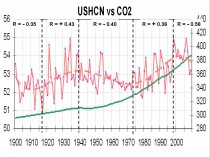
Enlarged here.
The Russian scientists Klashtorin and Lyubushin (2003) found a similar alternating pattern comparing GLOBAL temperature trends and World Fuel Consumption. They found a +0.92 from 1861 to 1875, a -0.71 from 1875 to 1910, +0.28 from 1910 to 1940, -0.88 from 1940 to 1975, +0.94 from 1975 to 2000.
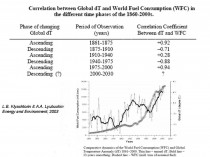
Enlarged here.
In the paper they projected a reversal post 2000 which has verified. This on again, off-again correlation suggests that CO2 is not the primary climate driver. Since the solar TSI and ocean multidecadal cycles are much better correlated, they are more likely candidates.
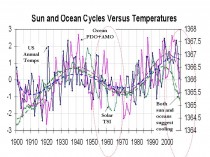
Enlarged here.
CO2, The Gas of Life
As opposed to be a pollutant or an agent of harm, CO2 is a blessing, a plant fertilizer that has supported an agricultural revolution. Nurseries use CO2 to boost plant growth in greenhouses, pumping it in at levels maybe 3 times ambient levels.
Just the increase in the last century has improved crop yields as shown by NASA greening studies and the UN’s own graph.
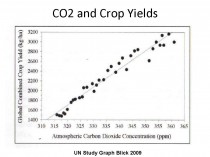
Enlarged here.
Yes better hybrids, better crop practices, fertilizers, insect and disease control as well as irrigation has helped, but CO2 has played a key role. This can be shown by isolating on CO2 and keeping other factors constant as shown in the following two studies:
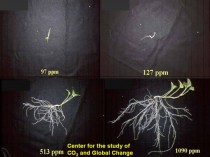
Enlarged here.
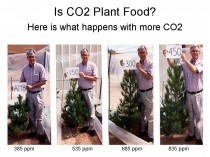
Enlarged here.
More CO2 means more plant growth. Yale professor Robert Mendehlson testified to congress in 2000, climate change as projected then by IPCC would result in benefits of up to $23B/year to agriculture and forestry
CO2 enriched plants are more drought resistant and have lower water irrigation needs. CO2 benefits crops under moisture stress most! This eases water supply issues in semi-arid regions and in Mediterranean climates like California, an added benefit. Ironically California greenies are all too anxious to negate that benefit under the delusion they are saving the planet.
We should be rewarding producers of CO2 not taxing them out of existence. Taxing them becomes a value-added tax as it affects of prices of all goods and services on the way to consumers. It is a highly regressive tax, hurting the poor and middle class the most.
But we know the real motive is not to save the planet but to address or generate revenues to pay for other issues that the administration favors.
NOAA’s Lubchenko when she was president of AAAS in 1999 said:
“Urgent and unprecedented environmental and social changes challenge scientists to define a new social contract...a commitment on the part of all scientists to devote their energies and talents to the most pressing problems of the day, in proportion to their importance, in exchange for public funding.”
The government has delivered to the tune of $79B so far to support the big lie.
We hear this week, the UN with the administration’s help is said to be seeking to tax the world $100B/year for 10 years to help fight climate change (a George Soros idea). That is $1 trillion the next decade - a redistribution to a totally corrupt and ineffective global organization.
The right US move would be to kick their collective corrupt butts out of New York City and turn off the spigot. And get off the carbon kick. Address real issues like the economy and jobs. Your wacky enviro friends may not appreciate it but the vast majority of real Americans would.
See the excellent summary ECO-FRAUD here.
Aug 11, 2010
Gore concedes on climate this year - Blames Congress, Media and Evil Skeptics
By Steve Milloy, Greenhell blog
Speaking about the likelihood of climate bill being passed by Congress in 2010, Al Gore told a conference call of supporters tonight that, “this battle has not been successful and is pretty much over for this year.” Gore bitterly denounced the Senate and federal government stating several times, “The U.S. Senate has failed us” and “The federal government has failed us.” Gore even seemed to blame President Obama by emphasizing that “the government as a whole has failed us… although the House did its job. [emphasis added]”
Gored urged his listeners to take the “realistic view that they had failed badly.” Gore said that “Comprehensive legislation is not likely to be debated” and that a “lame duck debate” is a “very slim possibility indeed.” (N.B. We thought, because Gore told us, that “the debate” was over.)
Gore said “the government was not working “as our founders intended it to” and laid more blame at the feet of fossil fuel interests who conducted a “cynical coordinated campaign” with “unprecedented funding” and “who have spent hundreds of millions of dollars just on lobbying.” He criticized “polluters” for “dumping global warming pollution into the atmosphere like it was an open sewer.” You mean like your own zinc mine classified as a toxic waste dump that in its last year of operation under Gore in his own words “pollution releases from the mine in 2002 placed it among the ‘dirtiest/worst facilities’ in the U.S.” That is true pollution unlike CO2 which has enabled an agricultural revolution that has fed tens of millions of the world’s people.
Gore blamed the skeptics for “attacking science and scientists.” “They [the skeptics] did damage and cast doubt,” Gore said.
Asked why the alarmists were ineffective in addressing Climategate, Gore bitterly blamed a “biased right-wing media… bolstered by professional deniers.” Gore claimed the Wall Street Journal published 30 editorial and news articles about Climategate and “not a single one presented [his] side of the science.”
Icecap Note: What about the mainstream media which whiffed on any coverage of climategate and the failed greenhouse science. As Itachner, a commenter to the story wrote: “The ultimate in chutzpah. Al complains about 30 editorials from the WSJ. What about the 30,000 one-sided stories and editorials from the NYT, the Wash. Post, the entire British press and the major TV networks? No Al, the reason your side lost is because like Lincoln said, you can’t fool all of the people all of the time. The next Nobel peace prize should go to the guy who exposed the climategate emails. He’s my hero.”
Speaking .about the post-2010 prospects for a climate bill, Gore tried to boost morale by stating that “the battle is not over” and that “we [alarmists] have no choice but to win the battle.” Gore said that “reality is [the alarmists] ally” and then, among other things, blamed recent flooding in Nashville and the Russian heatwave/forest fires on global warming.
He concluded by observing that “it is darkest before dawn” and “we have not yet begun to fight.”
In a warm-up discussion before Gore addressed the call, National Wildlife Federation chief Larry Schweiger referred to the skeptics as “enemies” and that he hoped the alarmists would “outlive the bastards.” See story and comments here.
ICECAP NOTE: Mr. Gore we have just begun to fight.
Aug 05, 2010
The Ozone Hole Debacle from an Insider
By Will Happer
The Montreal Protocol to ban freons was the warm-up exercise for the IPCC. Many current IPCC players gained fame then by stampeding the US Congress into supporting the Montreal Protocol. They learned to use dramatized, phony scientific claims like “ozone holes over Kennebunkport” (President Bush Sr’s seaside residence in New England). The ozone crusade also had business opportunities for firms like Dupont to market proprietary “ozone-friendly” refrigerants at much better prices than the conventional (and more easily used) freons that had long-since lost patent protection and were not a cheap commodity with little profit potential.
I was the Director of Energy Research at the US Department of Energy at the time, and I knew very well that the data to support the treaty was not there. Ever since Dobson’s first expeditions to Antarctica in the early 1900’s, we had known that ozone levels were always low over the Antarctic, but we had no real idea of what the natural fluctuations were. As far as we know, there has always been an ozone hole over Antarctica, with a size that varies from year to year. The size of the hole has hardly changed since 1990, as you can see from NASA’s site.
I don’t know what the current status is, but two or three years ago, some researchers at the Jet Propulsion Laboratory of the California Institute of Technology remeasured the rate of ozone destruction by the key chlorine oxide, and they found a number about 6 times smaller than the one promoted during the freon-ban crusade. Even the establishment value was really not big enough cause substantial ozone depletion. The ozone hole over Antarctica involves high-altitude “ice” particulates, made from a witch’s brew of water, nitric acid, chlorine etc. It is not clear if freon has made any difference to this. The behaviour of these ice crystalsmay be more determined by the stratospheric temperature and the amount of water vapor in the stratosphere, all changing with time at the poles. At any rate, stratospheric freon and its breakdown products are steadily diminishing, but little is happening to the ozone hole.
As Director of Energy Research, I argued strongly for better measurements to be sure we understood the science well enough to support the Montreal Protocol. I did manage to get a new network of UVB sensors deployed to measure year-to-year changes of ground-level UVB. The existing network was an embarrassment to the alarmists since it showed stable to decreasing UVB levels. I thought that this might be analogous to the urban heat island problems that so vex ground-based temperature measurements. Suburbs had grown up around the old network, so there was the possibility that air pollution was increasingly attenuating UVB. The new DOE network had real rural sites, as far as possible from urban smog. These activities really infuriated Al Gore, who had me fired as soon as possible after becoming Vice President.
The Montreal Protocol may not have been necessary to save the ozone, but it had limited economic damage. It has caused much more damage in the way it has corrupted science. It showed how quickly a scientist or activist can gain fame and fortune by purporting to save planet earth. We have the same situation with CO2 now, but CO2 is completely natural, unlike freons. Planet earth is quite happy to have lots more CO2 than current values, as the geological record clearly shows. If the jihad against CO2 succeeds, there will be enormous economic damage, and even worse consequences for human liberty at the hands of the successful jihadists.
See this report on the Nature story of the collapse of the ozone hole consensus here.
|











